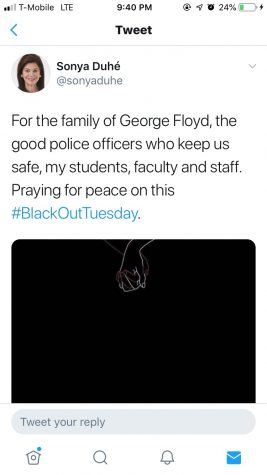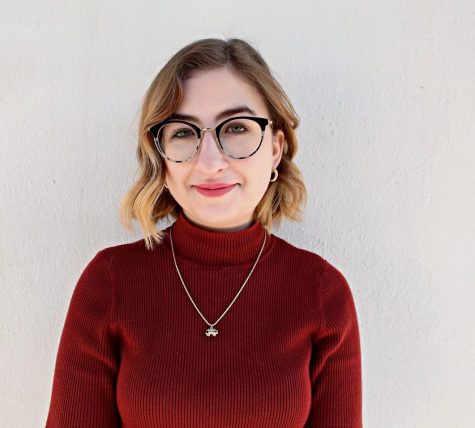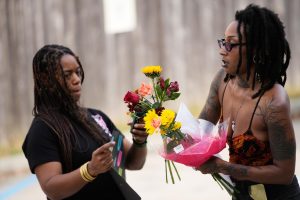Outgoing Loyola director under investigation at Arizona State
Tapped as new ASU dean, School of Communication and Design’s Sonya Duhé is under examination for allegations of racism, insensitivity by former Loyola students
Sonya Duhé poses in front of the anchor desk in Studio A at Loyola in early 2020. Duhé is suing Loyola University New Orleans, where she taught for more than a decade, claiming the school violated her contract by not welcoming her back as a member of its faculty after Arizona State University nixed her as its next journalism dean amid allegations of racism back in June.
June 5, 2020
Arizona State University is investigating Sonya Duhé, Loyola’s outgoing journalism school director and the recently-appointed Dean of the Walter Cronkite School of Journalism and Mass Communication at ASU, for allegations of racism, insensitivity and mistreatment of students of color during her decade-long career at Loyola.
ASU Provost Mark Searle said that he was recently notified “of concerns of her past treatment of students, and in particular, students of color,” at Loyola, and that ASU is looking into the situation, according to an email sent to students in the Cronkite School.
ASU representative Katie Paquet said they were unaware of past racial bias complaints filed against Duhé, who is white, during the hiring process.
A now deleted tweet by Duhé on June 2, in which she wrote, “For the family of George Floyd, the good police officers who keep us safe, my students, faculty and staff. Praying for peace this #BlackOutTuesday,” sparked the public conversation about her past conduct with students of color.

Whitney Woods, A’15, took to Twitter in response to Duhé’s message to criticize the former director for what Woods said was racist behavior by Duhé during her time at Loyola.
OK HERE WE GO. Dear KAREN…i mean SONYA.
There is no way in HELL that BLACK LIVES matter to you.
I would like respectively ask for you FUCK OFF.You are one of, if not, THE most racist human that I have ever encountered in a professional setting. https://t.co/BQUoPpYqmR
— whit. (@dubw00ds) June 2, 2020
The Maroon has talked to nearly a dozen former and current Loyola students in the Mass Communication Program who said they felt there was an unhealthy culture of commenting on the appearance of female students and, particularly, students of color in the mass communication program during Duhé’s tenure at Loyola.
Two former students, both black women, said they filed formal racial bias complaints with the human resources department in response to interactions they had with Duhé. Both students also filed curriculum complaints involving Duhé regarding the senior journalism capstone class.
Patricia Murret, associate director of public affairs, said Loyola “is committed to racial equity and does not condone behavior that does not live up to our values. We encourage our community to come forward with such complaints, and we thoroughly investigate and act upon those findings. We also maintain student trust and employee privacy by not publicly discussing those cases. We do not publicly disclose the outcome of any employment investigations or findings – whatever the outcome— but we can and do participate fully in the vetting of candidates by other institutions.”
Sonya Duhé did not return multiple calls on Thursday and Friday for comment.
Leah Banks, A’19, filed a human resources complaint against Duhé in 2019, citing frustration with curriculum changes, racial discrimination, unethical conduct with students of color, restriction of advancement of students of color, violation of capstone requirements, bias based on race and gender, and a lack of adherence to Jesuit values.
“It wasn’t healthy, it was destructive and dehumanizing,” Banks said of her experiences with Duhé and the environment of her senior capstone journalism class.
Banks, who is black, alleged that during an in-class headshot session, “Dr. Duhé said that girls of African-American descent should have their hair ‘pressed’ or ‘neatly combed,’ and ‘not natural.’ She has said this numerous times before including bringing hairspray to newscast days,” according to a 104-page human resources investigation report reviewed by The Maroon.
Banks also said in the complaint that Duhé had been, “Touching the hair of African American girls” in class. While Banks was interested in going into medical communication and becoming a writer, Banks wrote in the report that she felt pressure from Duhé to go into broadcast due to her physical appearance. In the report, Banks wrote that Duhé had been “making it blatantly clear orally that I need to relinquish my dream because I am ‘pretty enough for television.’”
In response to the formal complaint back in 2019, Duhé denied ever telling female students of color to get their hair “pressed” or treated for headshots or camera and called Banks’ complaint “ludicrous,” according to the investigation report.
“In fact, I’ve never heard or used the word ‘pressed’ in regards to people’s hair. Never did I tell students of African-American descent to ‘not be natural’ when dealing with their hair,” Duhé said in the report. “I expect all students, male and female, taking a professional photograph to be well groomed.”
Duhé also wrote in the complaint that she had never touched the hair of black female students, and that physical interactions with anchors and on-screen personalities during a newscast is typical in the business.
“Any ‘fixing’ to collars, hair, adjusting hearing devices/earpieces for air so that cords don’t show, getting mics on students’ labels and hiding cords, is an absolute standard part of what is a professional norm in television news,” Duhé said in the report. “I have never created a hostile environment in my class, verbally harassed or had verbal or physical aggression against Ms. Banks or any student.”
The university’s investigation of Banks’ complaint stretched beyond her senior year graduation and into September 2019, when she said she received correspondence from the university that the investigation had been closed.
Pressure black news anchors have felt to avoid wearing natural hair on camera has been an industry-wide conversation for years among broadcast journalists. Sheba Turk, WWL-TV anchor who is known for her natural hair on TV, said in a 2019 interview with local journalist Casey Ferrand, that she wore her hair straight and chemically treated for years at the advice of fellow black women in order to get her foot in the door in the TV news industry.
“I trusted them, and I don’t think they were wrong,” Turk said during the interview. “I don’t even think sometimes that we realize the messages we are getting or sending out. I didn’t consciously think ‘Oh to be a professional pretty black girl means straight hair,’ but that’s what every image was telling me.”
Other black women in TV news such as Brittany Noble and Janai Norman have talked publicly about pressure they felt to wear their hair straight for years before going natural.
Journalism Professor and Advisor to The Maroon Michael Giusti, who was not involved in the reporting or editing process of this piece, worked alongside Duhé for 11 years and was witness during the human resources investigation process to Banks’ complaints against Duhé.
Giusti, who is white, said that he never saw behavior from his colleague that concerned him to the point of requiring intervention.
“I have seen her be challenging, I have seen her be abrasive, I have seen her be stubborn and demanding and sometimes she has been insensitive, but I have never seen her be racist,” Giusti said of Duhé . “She has flaws, she has her faults. I think that, on balance, what she brings to the classroom, what she brings to the students, outweighed any concerns that I might have had.”
“Over the years, I have spoken with many students who have had complaints about her. I can honestly say though I think that those came from a place that was not based on race, it was coming from disagreements, misunderstandings, or just clashes of personality,” Giusti said.
White students as recently as 2020 have also expressed frustration to The Maroon with what they felt were critical and unwarranted comments made to them by Duhé about their physical appearances as well as their ability to have careers in journalism.
In the same complaint where she brought up allegations against Duhé, Banks also cited frustrations with what she saw as changes to the class schedule for her senior capstone class and subjective grading, that Duhé said had been outlined in the syllabus, according to the grievance report.
Woods, who wrote the June 2, 2020 tweet in response to Duhé, said she filed two bias incident reports against Duhé during her time at Loyola as well as one human resources complaint against what was, at the time, the School of Mass Communication regarding the journalism curriculum.
“We are at a time when we can’t keep being quiet anymore and I am very sad that all of my opportunities to try to shine a light on her actions fell through during my four years, and I carry tons of guilt about that,” Woods said.
Woods, a former member of The Maroon staff, said she filed her first report back in 2014, in response to a journalism class taught by Duhé and Journalism Professor Lisa Collins, who was recently named interim director for the School of Communication and Design due to Duhe’s departure to ASU.
That particular day of class back in 2014 focused on on-camera appearances, according to Woods, who said that the majority of the examples shown were white women anchors with long blond hair. A classmate of Woods’ at the time, who chose to remain anonymous, said that the only examples of black women anchors shown to the class had tightly cropped or unnatural hair.
Woods, who is black, said she asked Duhé why none of the examples of broadcast journalists had natural hair like hers and that the experience left her feeling uncomfortable and like she would have to physically change herself for a future in journalism.
Woods said she went to file an HR complaint about the incident, but she said she was informed there was already an active case regarding other students’ complaints against Duhé. So, she folded her statement into the already active case and said she was notified months later that the university had closed its investigation.
Nia Porter, A’15, said she remembers sitting next to Whitney in class and feeling uncomfortable. Porter also said she was a witness in Whitney’s human resources complaint.
Despite having been the first ever black editor-in-chief of The Maroon back in 2015, Porter and Woods said the historic moment was never reported by The Maroon because they said Duhé and other faculty members advised it would be embarrassing to publicize how long it took the publication to elect a black leader.
Porter said she has distanced herself from her time at Loyola because of experiences she had with Duhé that she said altered her self-confidence.
“I have tried to avoid talking about my time there. It is triggering to talk about my time there,” Porter said. “I asked myself ‘Can I be successful?’ I didn’t feel that from her.”
In late 2014, Woods said she filed another complaint with the university regarding Duhé, after she said Duhé told her she didn’t “act black” and asked about her “African roots” when Woods went into her office proposing the school host a black graduation celebration for students of color and first generation students.
“I walked down the hallway, I stepped into a classroom and I am on the floor bawling,” Woods said. “I was just like, how can you be so tone deaf of a human being and so nonchalantly run off these questions and not see my reaction?”
Emails provided by Woods to The Maroon show that she reached out to human resources about a conversation with Duhé about black graduation and that Woods received notification months later that an investigation she had been involved in had been resolved in early 2015.
Woods said she was also a witness to three other students’ formal complaints to the university about Duhé’s conduct during her time at Loyola, as well as a formal grievance against the School of Mass Communication her senior year regarding changes to the journalism curriculum, in which the university found in favor of Woods and a group of other students, according to a copy of the curriculum grievance provided by Woods to The Maroon.
When it came time to leave Loyola, Woods said Duhé did not sign her diploma.
“I do think about her in a way that, if there is one person in my entire lifetime that I have wanted to prove wrong or wanted to show that despite how you treated me or what you said I didn’t need you, ” Woods said.
Caroline Gonzalez, A’17, never filed a formal complaint with the university about Duhé’s conduct, but she said she felt pressured by Duhé to alter her appearance and straighten her naturally curly hair, a result of her half-Arabic and half-hispanic heritage, for her appearances on class newscasts and videos.
“That was really challenging for me because I was a student-athlete and I was coming from practice and trying to do my best to clean myself up and be in front of a camera,” Gonzalez said. “Making it straight is, in my eyes, making it white.”
After one parent-teacher meeting involving her father and Duhé, Gonzalez said she was talking to her then-professor about makeup, when she said Duhé gestured to her nose and told Gonzalez that she could “do something about it.”
Gonzalez said she thought about that interaction with Duhé for months and that summer, she got a consultation for a nose job.
In a separate interview with The Maroon, Gonzalez’s father said that he remembered Duhé talking about his daughter’s nose as well as his daughter repeatedly talking about Duhé’s comments before asking to meet with a doctor about plastic surgery.
“I was that serious about, if this is what I need to do to be in front of a camera, then I guess that’s what I need to do,” Gonzalez said. “I took her words and I weighed her words that heavily that I literally went to get a consultation to get a nose job just to please her.”
While she said she understands the need for professors to be honest with students about what the industry will look like post-graduation, Gonzalez said her interactions with Duhé altered the way that she viewed herself, her identity and her future.
“I wanted to brush it off and have thick skin. To be in this industry, you have to have thick skin, but when it is coming from a person of influence, from someone in a position of power, it cuts a little deeper,” Gonzalez said. “She took my heritage from me, she took who I am from me and basically white-washed me.”
Paquet said, on behalf of ASU, that the university currently has a consulting agreement with Duhé and no changes have been made to her status as an incoming dean. While the university is investigating claims by former students, Paquet said Duhé is still scheduled to start her new position July 1.









Courtney Hall • Jun 6, 2020 at 11:29 am
She has also come up to people with acne and told them they needed to get on medication or see a doctor for their appearance. She has suggested that people with acne take accutane. (I’ve heard it was a bad drug.) One time in class she said if you don’t have good personal hygiene then you won’t get a job. She was looking directly at me and I was going through a terrible break out. I know of 3 people including myself she has done this too. She did it in an underhanded way. It was so uncomfortable. It was like she was trying to help but she was also trying to make us feel bad enough to go see a dermatologist. I get rude comments all the time about my acne and body in general so I didn’t think anything of it but the other girls did see a doctor about their skin. Both girls still have acne because it’s not something you can just cure.